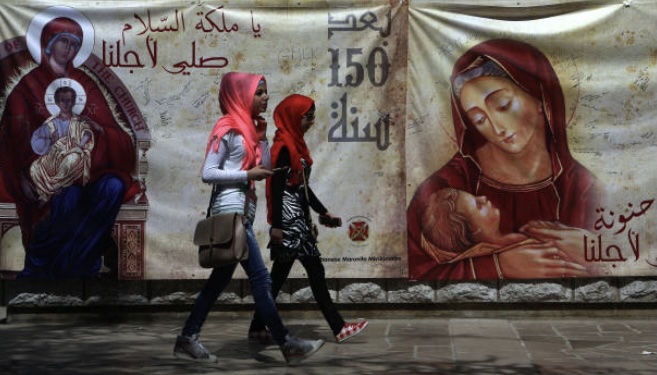Uniting Through the Virgin Mary: A National Holiday for All
In a world often fractured by religious and cultural divides, Lebanon offers a compelling example of unity through shared spiritual heritage. The Annunciation Day holiday, celebrated each year on March 25, stands as a testament to Lebanon’s commitment to interfaith dialogue. Officially declared a national holiday in 2010, it honors the Virgin Mary—a revered figure in both Christianity and Islam—and symbolizes the country’s aspiration for peaceful coexistence.
The initiative to establish this holiday was led by Nagi El Khoury, Secretary General of the Islamic-Christian Assembly around the Virgin Mary in Lebanon, and Sheikh Mohammad Nokari, former Director of Dar El-Fatwa. Inspired by Mary’s prominence in both the Bible and the Quran—where she is mentioned 37 times—they envisioned a spiritual bridge between faiths. For Christians, Mary is “the Mother of God”; for Muslims, she is “the Sovereign Lady of the Worlds.” This mutual reverence laid the foundation for a movement that transcended sectarian lines.
The first Islamic-Christian celebration of Mary took place on March 25, 2007, at Our Lady of Jamhour Church in Mount Lebanon. The gathering featured joint prayers—Christian “Abana” and Muslim “Al-Fatiha”—symbolizing shared values and spiritual solidarity. Although some groups initially resisted the idea, questioning the need for a new holiday or interfaith rituals, the organizers emphasized that the initiative was not about merging doctrines. Rather, it was a recognition of common moral values, mutual respect, and the urgent need for peace. Over time, the movement gained broad support across Lebanese society.
Promoting Dialogue and Understanding
This initiative extended far beyond symbolic acts. El Khoury and Sheikh Nokari actively engaged religious leaders from different communities, fostering difficult yet vital conversations to break down stereotypes and build trust. Through cultural events, shared traditions, and spiritual gatherings, they nurtured a culture of pluralism, peaceful exchange, and cooperation—contributing to social cohesion in a fragile national context.
A Movement for Peace and Social Stability
The recognition of Annunciation Day as a national holiday marked a historic turning point. It became the second official nationwide celebration after Independence Day. Its importance lies not only in spiritual symbolism but also in its role as a pillar of national unity amid ongoing political and economic challenges.
Since its establishment, the movement has grown to include more than 35 associations and networks committed to promoting interfaith harmony. El Khoury has tirelessly worked to share Lebanon’s model internationally. In 2017, he met with Pope Francis to present the Icon of the Annunciation. During their meeting, the Pope commended the initiative as a promising model of coexistence and urged continued efforts to deepen interfaith understanding. Other initiatives, like creating special cookies for Annunciation Day inspired by both Christian and Muslim culinary traditions, have added cultural richness to the celebration—demonstrating that faith-based unity does not require compromising theological integrity.
Fasting Traditions: A Shared Spiritual Journey
In 2025, another convergence reinforces Lebanon’s spirit of interfaith solidarity: the overlap of Ramadan fasting for Muslims and Easter Lent fasting for Christians. Both observances highlight discipline, sacrifice, compassion, and devotion to God—reinforcing values that transcend religious boundaries.
1. Spiritual Discipline:
Ramadan requires abstaining from food, drink, and other physical indulgences from dawn to sunset, encouraging humility and self-restraint. Lent, similarly, involves giving up luxuries and practicing penance in preparation for Easter.
2. Acts of Charity:
Both traditions emphasize supporting the needy. Muslims give zakat (charity) during Ramadan, while Christians perform acts of kindness and almsgiving as a core aspect of Lent.
3. Community Bonding:
Ramadan fosters social unity through communal iftars and nightly prayers. Lent, though more introspective, also includes shared worship and community service.
4. Reflection and Repentance:
Both fasts center on inner transformation—Ramadan through seeking forgiveness and spiritual renewal; Lent through repentance and deepened prayer.
5. Joyful Celebrations:
Each fast ends with a major celebration—Eid al-Fitr for Muslims, marking the end of Ramadan, and Easter Sunday for Christians, commemorating Christ’s resurrection.
Together, these shared experiences reinforce empathy, moral responsibility, and hope across faiths.
A Vision for Global Unity
Lebanon’s example has inspired other countries seeking to foster interreligious understanding. The Annunciation Day holiday underscores how shared values—love, peace, and respect—can help societies overcome sectarianism. As Nagi El Khoury once remarked, “We need connection instead of division; empathy and openness instead of isolation and discrimination.”
By embracing both Ramadan and Lent, alongside Annunciation Day, Lebanon demonstrates how deeply rooted spiritual traditions can unite rather than divide. This triad of observances invites the world to reflect on our common humanity and the possibility of peace through shared purpose.


 Creative Commons Attribution 4.0 International license
Creative Commons Attribution 4.0 International license